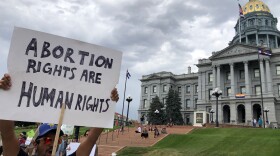On Friday, the Supreme Court overturned Roe v. Wade, a ruling that for nearly half a century had protected the constitutional right to abortion for people across the nation. Now, the decision on whether abortion will remain legal is turned over to the states. Colorado has laws on the books that protect abortion in this state, but for many surrounding states that isn’t the case.
KUNC’s Samantha Coetzee spoke to Kate Coleman-Minahan, an assistant professor and nurse practitioner with the University of Colorado’s College of Nursing. She studies how policy and clinical practice impact access to, and quality of contraceptive and abortion care.
Interview Highlights:
These interview highlights have been lightly edited for length and clarity.
Samantha Coetzee: What are we seeing in abortion clinics in Colorado right now, post-decision?
Kate Coleman-Minahan: Well, I do not provide abortion care myself, but my colleagues told me that after Friday's decision, they received a huge increase in phone calls from people in and outside Colorado who are anxious and afraid and asking for abortion and contraceptive care. So we're already seeing a chilling effect, which is when people fear exercising their rights, including accessing health care.
I care for people who need abortions. And several years ago, we saw a chilling effect among providers when the federal government prohibited us from certain types of counseling and abortion referrals. And that caused a lot of uncertainty and anxiety about what we could and could not do. Abortion care is protected here, and people will get the care they need in Colorado. But there's so much legal uncertainty. We can expect a lot of fear and anxiety among people needing care as well as health care providers themselves.
Coetzee: States close to Colorado like Wyoming, Utah, Oklahoma and Texas could soon have near total bans on abortion. That’s because of their so-called “trigger-bans” – designed to immediately ban abortion if the Supreme Court overturns Roe v. Wade, which just happened. What is Colorado expecting to see from those states?
Coleman-Minahan: Researchers have estimated that since Texas enacted its six-week ban in September, about 1,400 people each month have left the state to get essential health care — many of whom have come here to Colorado. So we've already seen greater numbers of people getting care here in Colorado, and that is only going to grow as neighboring states ban care, including states like Utah and Oklahoma that declared abortion care to be illegal starting on Friday. The increase in people seeking care in Colorado has resulted in longer wait times and delays, even among Coloradans, already. And we know abortion bans will disproportionately impact people who don't have the resources to travel. People who largely have low incomes, people of color, young people, immigrants. And so we in Colorado are going to be seeing the people who actually have the means to make it here.
Coetzee: Is there anything else we should expect locally regarding this decision in the coming weeks?
Coleman-Minahan: There's a lot we don't know yet, but we do know that locally in Colorado, people already face barriers to accessing care, not just because of the increase in volume we're seeing, but also because of Colorado's two abortion restrictions. We have a ban on state Medicaid funding to pay for abortion. And we have a law that forces young people to involve a parent or obtain permission from a judge to get an abortion, which, as my research has shown, is extremely harmful and will only compound the enormous barriers that young people will face trying to get to Colorado. There's a lot of Coloradans right now asking how to help, and local efforts are needed to remove these local legal restrictions, provide legal protections for health care providers in the state, and to expand the capacity of health care providers across the state.





